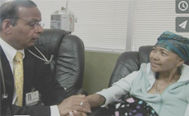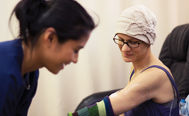 Cancer treatment therapies tend to affect every person differently. While one may experience fatigue and loss of appetite with chemotherapy, another may experience severe nausea and vomiting. Some side effects can be mild, while others can be more debilitating than the illness itself.
Cancer treatment therapies tend to affect every person differently. While one may experience fatigue and loss of appetite with chemotherapy, another may experience severe nausea and vomiting. Some side effects can be mild, while others can be more debilitating than the illness itself.
Maintaining as much physical strength as possible through treatment is an important priority, and with a little trial and error and experimentation, certain foods and adjustments in eating schedules and routines can help to make food more palatable and enjoyable through radiation and chemotherapy treatments.
Your Cancer Treatment and Diet
Don’t Force It – While staples like chicken soup or steamed rice may have been a go-to food to relieve nausea and vomiting in the past, cravings and the effect that certain foods have after chemo and radiation can change, sometimes as frequently as one day to the next during the course of treatment. The most important thing is to stay hydrated and to obtain enough nutrients, especially during bouts of nausea and vomiting.
Trying different meals and combinations to find what works best during each episode is a good rule of thumb. Easy to digest foods like mashed potatoes or plain noodles can help to settle the stomach and provide nutrients. Avoiding strong smells is also a good way to curb and avoid nausea.
Don’t Forget the Fiber – Constipation is a common side effect of many cancer drugs. Eating whole grains and fresh fruit can help to mitigate the uncomfortable side effects of constipation-causing drugs.
Eat less more often – Smaller meals evenly spaced throughout the day can be easier to digest, help to keep the stomach settled and keep bowel movements regular, as well as provide necessary nutrients to prevent weakness and fatigue.
Pack a Snack – Eating before scheduled treatments can help to prevent food associations with nausea and vomiting that can make it difficult to eat once the side effects of treatment have kicked in. Carrying protein rich snacks and dried fruit to eat in small amounts throughout the day can help with nourishment when even small prepared meals are too difficult to digest.
Stay Hydrated – Even small sips of water throughout the day and between bouts of nausea and vomiting are necessary to prevent dehydration. Adding herbal tea and warm lemon water can help to settle the stomach and keep fluids down. During frequent bouts of vomiting, it may be necessary to add sports drinks in order to replenish the nutrients lost through vomiting.
As side effects and symptoms develop and progress, consult with your oncologist to ensure that caloric and nutritional needs are met during and after treatment.
Cancer treatment in Los Angeles
To learn more about cancer diagnosis and treatment options, or to obtain a second opinion on a previous diagnosis, contact the Cancer Center of Southern California at 310-879-1099 to schedule an appointment with an oncologist today.



